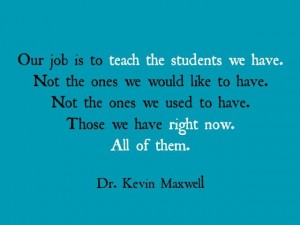What is the meaning of the terms professionalism, and semi-professionalism?
To be honest, I was really tripped up by the term “semi-professionalism” and I had to do some research on the terms. According to Tamar Ruth Horowitz, classifying teachers as professionals or semi-professionals can be like opening a can of worms (297). Horowitz defines professionalism as being based upon a systematic body of knowledge which is both theoretical and practical, an essential service to the community, involving a high degree of authority, has a specific code of ethics, and requires a high level of commitment (297). Semi-professionalism on the other hand, requires only a short period of training and a lower level of commitment, and typically females are semi-professionals [“whatever happened to social justice?!” – Justin Bailey] (Horowitz 297). Personally, I think a teacher is somewhere between a professional and a semi-professional because teaching is an essential service in our community, teachers do have great authority to a certain extent, teachers are highly committed to their career, and we do have a specific code of ethics here in BC. However, our program length is shorter than one required for lawyers and doctors and our primary goal is to communicate knowledge rather than apply it.
- What does the term ‘professional’ mean for my work as a teacher?
To me, being professional as a teacher means coming to school prepared with all the materials I need for my classes, communicating the curriculum content effectively, and caring for the well-being of my students (academically, emotionally, and physically). Being professional also means keeping my role and the responsibilities that come with it in mind, and acting within moral and ethical boundaries.
- How might my educational commitments be influenced by membership in professional bodies such as teacher unions, colleges of teachers and other professional organizations?
As a future member of the BC Teachers’ Federation and a member of the association of teachers of modern languages, I will be part of a team which means what my colleagues do affects me and what I do affects my colleagues, and what we all do as a collective group influences the public’s perception of our profession. Professional development and team bonding are very important to ensure that we continue to strive for excellence in our profession and in our respective subject areas. In essence, it’s not just about who I am as a teacher and how I teach, but also collaborating with my colleagues and watching out for their best interests.
- What are teaching standards and why do they exist?
Teaching standards are a set of rules and guidelines that lay out what the responsibilities of a teacher are and how a teacher should act both on and off the job. Teaching standards exist to ensure that teachers have excellent professional and personal character. Standards also provide new teachers with ideas of what they are responsible for and must keep in mind.
- What assumptions about education and teaching are implicit/explicit in the standard(s) (e.g., currently in BC these are represented by the ‘BC Standards for the Teaching’)?
Teachers are not only responsible for teaching the subject curriculum, they are also responsible for the welfare of their students. They not only have to know what to teach but how to teach it. A teacher’s responsibilities are not limited to the classroom, but they are expected to engage in the greater school community. Teachers are also held at a higher standard than many other citizens both when they are at school and in the general public.
- What alternative perspectives (autobiographical, historical, philosophical, sociological) might you bring to bear on standard(s) for teaching?
Coming from a Chinese background, I think I have equally high standards for teachers as the standards laid out in the BC Ministry of Education. In Chinese culture and history, teachers rank alongside the Heaven, the Earth, the emperor/government, and family as the five main authorities in a person’s life that this individual must respect. Therefore, a lot of deference is paid to teachers by Chinese people, and there is additional pressure for me as a teacher to live up to this role as one of the main authorities.
Being a child in a single-parent family also meant that I looked upon my instructors and teachers as the father figures in my life. I constantly remind myself that my future students may also look to me for a role model and this influences my standards for teaching.
- How might a particular classroom or school scenario complicate a given standard, illustrating the tensions, difficulties and/or dilemmas that may surround the standard in practice? Give a brief example.
During my practicum, I had a student in my grade 9 Mandarin class with special needs. I was told by my sponsor teacher that I cannot assign a letter grade to this student for term 2, just “no mark assigned” and comments. The student’s parent complained to my school advisor, asking why this decision was made and why she was not informed of it. This shows how there may be dilemmas surrounding standard #5 in the Ministry of Education standards regarding implementing effective practices for teaching strategies assessment, because what is deemed effective by most could be considered ineffective by some (e.g. this student’s parent).
Work Cited
Bailey, Justin. Personal communication. 8 July 2015.
Horowitz, Tamar Ruth. “Professionalism and Semi-professionalism among Teachers from the USSR and North America”. Comparative Education 21.3 (1985): 297-307. Web. 8 July 2015.

My name is Justin Bailey and I approve this page!